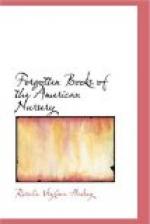Besides tales by English authors, there was a French woman, Madame de Genlis, whose books many educated people regarded as particularly suitable for their daughters, both in the original text and in the English translations. In Aaron Burr’s letters we find references to his interest in the progress made by his little daughter, Theodosia, in her studies. His zeal in searching for helpful books was typical of the care many others took to place the best literature within their children’s reach. From Theodosia’s own letters to her father we learn that she was a studious child, who wrote and ciphered from five to eight every morning and during the same hours every evening. To improve her French, Mr. Burr took pains to find reading-matter when his law practice necessitated frequent absence from home. Thus from West Chester, in seventeen hundred and ninety-six, when Theodosia was nine years old, he wrote:
I rose up suddenly from the sofa and rubbing my head—“What book shall I buy for her?” said I to myself. “She reads so much and so rapidly that it is not easy to find proper and amusing French books for her; and yet I am so flattered with her progress in that language, that I am resolved that she shall, at all events, be gratified.” So ... I took my hat and sallied out. It was not my first attempt. I went into one bookseller’s after another. I found plenty of fairy tales and such nonsense, for the generality of children of nine or ten years old. “These,” said I, “will never do. Her understanding begins to be above such things.” ... I began to be discouraged. “But I will search a little longer.” I persevered. At last I found it. I found the very thing I sought. It is contained in two volumes, octavo, handsomely bound, and with prints and reprints. It is a work of fancy but replete with instruction and amusement. I must present it with my own hand.
Yr. affectionate
A.
BURR.
What speculation there must have been in the Burr family as to the name of the gift, and what joy when Mr. Burr presented the two volumes upon his return! From a letter written later by Mr. Burr to his wife, it appears that he afterward found reason to regret his purchase, which seems to have been Madame de Genlis’s famous “Annales.” “Your account,” he wrote, “of Madame Genlis surprises me, and is new evidence of the necessity of reading books before we put them in the hands of children.” Opinion differed, of course, concerning the French lady’s books. In New York, in Miss Dodsworth’s most genteel and fashionable school, a play written from “The Dove” by Madame de Genlis was acted with the same zest by little girls of ten and twelve years of age as they showed in another play taken from “The Search after Happiness,” a drama by the Quakeress and religious writer, Hannah More. These plays were given at the end of school terms by fond parents with that appreciation of the histrionic ability of their daughters still to be seen on such occasions.




